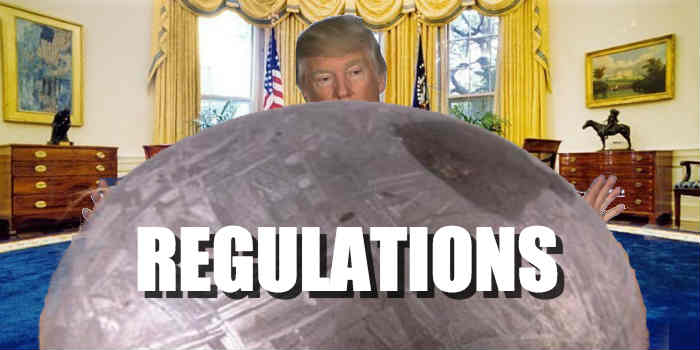By Dan Calabrese ——Bio and Archives--April 18, 2017
American Politics, News | CFP Comments | Reader Friendly | Subscribe | Email Us

President Trump last week signed the 13th bill repealing regulations through a potent tool called the Congressional Review Act (CRA), which allows Congress to reject rules in a majority vote within 60 legislative days of publication. The 1996 law had previously been used only once, when Congress and George W. Bush nixed an ergonomics directive from the Occupational Safety and Health Administration. Two other repeal resolutions have passed the House and are pending in the Senate. The list of rejects includes the Interior Department’s Stream Protection Rule, which would have eliminated a third of coal-industry jobs and usurped state authority over mining, for little environmental improvement. Awaiting Senate repeal is the Bureau of Land Management’s venting and flaring rule for natural-gas fracking. That aimed to reduce methane emissions, though they have already dropped more than 15% since 1990 even as U.S. energy exploration has doubled in a decade.
Other worthy targets: A Federal Communications Commission regulation that would have forced Comcast to abide by consumer privacy standards that Amazon and Google could ignore. Sen. Ben Sasse (R., Neb.) moved a bill to deep-six a teacher training mandate that features incentives for teachers to avoid struggling schools that need talented instruction most. The left is spreading panic about potential sludge rivers or killer toys, but these reversals merely restore the status quo of six months ago. Congressional Review actions do not include Mr. Trump’s executive orders, which have directed agencies to reconsider the trillion-dollar Clean Power Plan, the Labor Department’s financial advice diktat known as the fiduciary rule, among many others. Then there are the rules that agencies have delayed and may eventually scrap, from micromanaging ceiling fan efficiency to organic farming standards. Sam Batkins at the American Action Forum estimates that 15 delayed rules alone would require 10 million hours of paperwork. That time could be devoted to activities that produce wealth and innovation, and the main losers would be compliance lawyers. The White House and Senate Republicans have said the 60-day review period for Congressional Review Act measures will end next month. But our colleague Kimberley Strassel has explained how the law applies to past rules that agencies failed to report to Congress as required. The same is true for “guidance” letters, such as the Education Department’s sexual assault “Dear Colleague,” that were imposed with the force of law without having to go through a public comment period.
Support Canada Free Press

The Administration could require agencies to work up lists of rules that were not properly reported, and send them up for rejection. Bonus: If Congress disproves a rule, the CRA stipulates that an agency cannot issue the same regulation again. That is much more powerful than perennial blue-ribbon regulatory commissions or a pledge to identify two old regulations to replace for every new one, which usually achieve less than advertised.Of course, even independent of this process, a regulation that was established administratively can be rescinded administratively, which means Trump can always order the agencies under him to undo what Obama did. It makes sense that there is an established process by which to assess the impact of rules so that any administration imposing or getting rid of regulations has to demonstrate a rationale for doing so. But politicians often hide behind the complexities of process to avoid doing what really just requires political will. That said, the Congressional Review Act was put in place to put a check on regulation-happy presidents, which presumably means Democratic ones - not that no Republican president has ever fallen in love with rulemaking. If Republicans are going to put a law like this in place to serve as a check on Democrat administrations, it would be a mistake to just ignore the law when one of their own is in office. Eliminating regulations via the CRA makes it harder to bring them back, and puts greater force of law behind the deregulation effort. Republicans often complained, justifiably, that Obama usurped the power of Congress with his "pen and phone" style of governing. If it's possible to undo the damage without relying so heavily on the executive order, it's a good idea to do so. Either way, conservatives should be very pleased with Trump's early returns in the realm of deregulation. It's just a start, of course, and Obama went so hog wild on the regulatory front that it could take two full terms to undo all the damage. But Trump's early instincts are clearly to dismantle the regulatory state as much as he can rather than to use it to build his strongman kingdom. That should reassure those who thought he would operate as a big-government authoritarian. I don't think movement conservatives pay enough attention to regulation as a tool of big government. A lot of it happens under the radar screen and it's hard to light a fire under activists over Rule D, Section 71.A, Addendum R. But they should pay more attention to it, because it explains a lot about why it's so hard to reverse the power of big government - even when we have a Republican president and a Republican Congress. It is also evidence that the president we have now is doing more important work than a lot of people realize.
View Comments
Dan Calabrese’s column is distributed by HermanCain.com, which can be found at HermanCain
Follow all of Dan’s work, including his series of Christian spiritual warfare novels, by liking his page on Facebook.